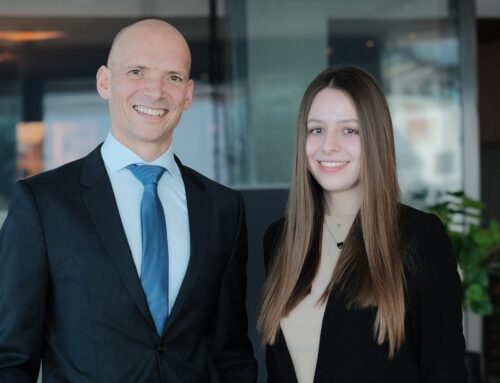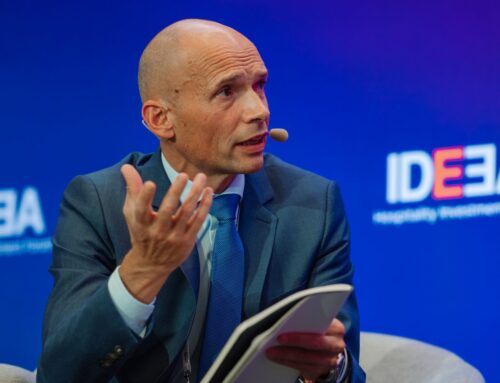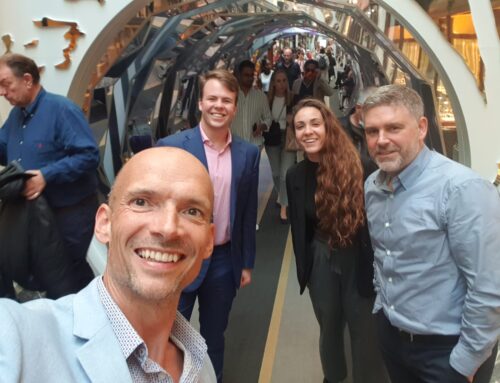Universities look to rewrite the book on hospitality education, as faculty looks to get on the same page
Even as the world is shrinking thanks to advances in technology, travel and greater connectivity, the hospitality universe continues expanding. And that universe is very, very complex, according to some top university educators, who see it becoming more so every day.
The need to keep up with changes, generated either by shifts endemic to the lodging industry or by outside influences and disrupters, has become key in academia, whose purveyors of knowledge are combining any number of programs in theory and applied practices with nuts-and-bolts internships, mentoring and acquiring a solid base in business acumen.
“What I learned in the 1980s would make me a dinosaur if I stuck with it today in 2017,” said Peter Ricci, director of hospitality and tourism management at Florida Atlantic University (FAU).
Interestingly, FAU is among a growing number of higher-education venues that are themselves causing change, notably incorporating hospitality programs within hard-core business schools that graduate BBAs and MBAs.
Last year, Ithaca, NY-based Cornell University—considered by many industry observers as the mothership for churning out hotel executives—said it would create a College of Business that would pull in its School of Hotel Administration, the Charles H. Dyson School of Applied Economics and Management, and the Samuel Curtis Johnson Graduate School of Management, with each school retaining its goals and identity while benefiting from additional offerings.
Still, there remain two—ahem—schools of thought as to whether that’s the best direction in which to head, with educators at business schools and those at hospitality management programs having, as one might expect, different opinions.
Some say a business/financial education base is what’s needed for hospitality students; however, career hoteliers aver the industry is its own animal and general business acumen is not enough, that the student intent on working for a commercial bank will not face the same challenges as a hotel-revenue wrangler.
According to Kristin M. Lamoureux, associate dean at the NYU School of Professional Studies (NYU SPS)/Jonathan M. Tisch Center for Hospitality and Tourism, while many have achieved major success in the industry without much formal or specialized education, “How many have tried and got frustrated because they struggled with the nuances of our industry? Hospitality is a specialized industry. Not only do you need a specialized skill set, you also need what many call the ‘hospitality gene’ or the personality that works well in our high-touch industry. As hotels, restaurants, venues, etc., become more specialized, so do the skill sets needed to work in them.”
From his perspective, Ricci, who has worked in hospitality as well as in education, felt a “good” hospitality education “would prepare students for today’s business world—not the ‘touchy/feely’ or yesterday’s vocational components. They would take all of the core courses that provide a foundation for any business that exists so their skills would be transferable outside the hospitality industry if necessary: organizational behavior, management, marketing, finance, accounting, quantitative methods, reading a profit-and-loss statement, etc.
“In addition, the students should take a complement of the core hospitality courses: food and beverage, guest service, hotel or resort management, meetings and events if desired, private-club management, etc. They should also have a very rigorous hospitality-finance course tying things together to the management and profitability enhancement that they will face as a business operator,” said Ricci.
FAU has 800 students per semester and its MBA in Hospitality & Tourism Management is a pure MBA with the complement of additional credit hours mixed in that are hospitality-business specific. “In that program, we maintain about 30-50 students per cohort,” he said.
With its new College of Business, Cornell’s Interim Dean and E.M. Statler Professor, Office of the Dean/School of Hotel Administration Kate Walsh does not see “a real dichotomy between our students who are focusing on real estate, finance and analytics and those who are more focused on hotel operations. The way the industry is evolving, these are two sides of the same coin. If you are a finance person (an asset manager or owner), for example, you have to know the industry inside and out so that you can maintain the value of the asset, in part by ensuring that the management company offers effective and efficient service.”
She continued, “On the other side of the coin, the management company’s goal in operating the hotel is to provide exceptional service, with one goal of enhancing the value of the asset. There are many pieces to making that happen, and these pieces are complementary, so that each aspect of the industry—and each aspect of what we teach—works toward effective outcomes.
“The industry and, thus, our educational program go far beyond hotel operations, but operations is the essential building block and we never lose sight of it.”
Cornell’s undergraduate population has more than 900 students and more than 100 graduate students. Last May, it conferred 271 BS degrees and 66 master’s degrees.
At the University of Las Vegas (UNLV), operational expertise is a key program component.
“At the end of the day, people need to run these hotels, they need to run these restaurants and working in the hospitality industry is a passion, it’s a lifestyle; it’s not necessarily a job,” emphasized Stowe Shoemaker, dean of the William F. Harrah College of Hotel Administration at UNLV. “With many organizations that hire people with MBAs coming out of Wharton and Stamford and all that, there’s a high turnover rate of those MBAs because they go: ‘Oh, my God. This is hospitality. I’ve got to work Christmas. It’s open 24 hours. I’d rather be a banker where my hours are more regular.’ So, our belief here is that we’re training the future GMs, the future managers of these major companies. Yes, the CEO may have come from Wall Street because these are financial things but, at the end of the day, someone’s got to run these properties.”
At Pennsylvania State University, “The heartbeat is really financial management through operational insights,” said Donna Quadri-Felitti, associate professor and Marvin Ashner director of the School of Hospitality Management. “Our undergraduate curriculum has four finance and accounting courses in it. In fact, our students will take general accounting in the business school and they will take hospitality accounting, they will take hospitality financial management and hospitality finance. That’s before they’ve decided whether they want to go into development or operations, or if the want to be a GM or they want to be an investment analyst; that’s the minimum. The profession is complex. You need to understand all the moving parts. So, at the heart of that, you have to understand where the money’s made, but operational experience, operational management savvy and people and customer savvy cannot be divorced [from] the balance sheet,” she said.
The premise that a business/finance degree is enough to have success in hospitality was mulled by Quadri-Felitti, who suggested the learning curve would be much steeper “and the risk for error would be much deeper and [lack] the sensitivity or the orientation to the soft skills—the service and labor component—that our business requires. It will take a lot longer for [the person] to realize their potential in the business.”
She continued, “If you can’t understand yield in the back of the house, can’t understand back ops, don’t know what your business traveler/customer really wants, don’t understand what it takes to run a union shop or what it means to turn over a room and sell that room every day, or turn that [restaurant] seat or table over every day, and make money out of that banquet space…the decision-making process will be more at risk and laborious.”
She added that Penn State holds three graduations a year of approximately 210 students from its School of Hospitality Management.
What the educators do agree on is the hospitality industry over the past decade or two has changed substantially, no longer being perceived as dead end or simply a stepping-stone to something “better.”
“Over the past 25 years, we’ve seen a lot of hospitality programs emerge at every level, from community colleges to four-year schools and graduate programs. The growth and internationalization of the industry has driven much of the demand for an increasingly diverse, skilled workforce,” said NYU’s Lamoureux, adding, “Technology has had, and continues to have, a major impact not only on how a hotel is run but in how we have to teach our students. Schools that do not understand how the industry is using technology and can translate that into the classroom are at a disadvantage.”
At NYU SPS, there are approximately 270 students (190 undergraduate/80 graduate) focused on hospitality/hotels (excluding those pursuing a graduate degree in tourism management). On average, 142 graduate each year.
A year ago at UNLV, the school established “Hospitality 2025,” bringing in some 45 different companies to look at what skill sets, what knowledge they’re going to be looking for in their [future] employees, so the faculty could develop a curriculum to meet those needs.
“So, last summer we paid faculty to go work in the industry. If you were in finance or accounting, we sent you out and you worked in hospitality accounting and you understood what are the things people are doing in hospitality accounting that we need to make sure that we’re teaching. Then we redesigned our courses around that,” said Shoemaker. “Then we sent someone out in technology. Technology is always changing. How does the industry use technology? And how should we be teaching technology to our students? And that course was redesigned around that.”
Shoemaker said UNLV is continuing the program and also is preparing to do a major study looking at the competencies students need in hospitality’s different disciplines, particularly in the area of supervisory skills and management-level skills, and has an advisory board in place that includes representatives from hospitality, food and beverage and gaming.
Additionally, UNLV is working to integrate class studies with practice. For example, one faculty member is redesigning her food-cost control course so she teaches theory for a few weeks and then the students work in different restaurants, costing menus based on what they’ve learned in theory. “So they’re learning the theory and applying it in real-world situations,” said Shoemaker. “And that’s just the start of what we’re doing.”
Currently, UNLV has approximately 2,300 undergraduates and graduates about 800 students a year. Fifty percent are from outside Nevada and an additional 22% are international.
Each school has its own approach to hospitality education, but all of them are smart enough to leverage their connections to successful alumni and industry executives who, for the most part, are wiling to share their various journeys and expertise with students.
According to Lamoureux, NYU SPS’ motto is: The city is our laboratory, the industry is our faculty, and our students are the future of the profession. “We remove the barrier between learning and industry by inviting the industry into our classroom [and] also by moving our classroom out to the industry,” she said. “We have a small, core, full-time faculty group who lay the groundwork and guide our curriculum. We supplement our full-time faculty with part-time faculty that are industry experts, active in their individual areas so that our programs maintain a solid mix of theory, research and practical experience… At the same time, our NYU International Hospitality Industry Investment Conference is a tremendous opportunity to engage with the industry at the highest levels.”
Most of the schools have requirements for graduation that entail students working in their specific chosen field. For example, students at FAU must work a minimum of 1,000 hours in the field prior to graduation in what Ricci termed “a real type of position. It can, indeed, be entry-level, but it must be something that forces them to experience the day-to-day life of working in our 24-hour/seven-day-a-week industry. This way they know if they are in the right field for themselves. Most of our students graduate with 1,500-2,000 hours of work experience.
“We approach our education also,” he continued, “by having ongoing annual discussions with industry advisor groups in terms of how our students are performing after graduation and what these employers feel is lacking in the classroom. We then incorporate their suggestions. Each year, we circle back, re-evaluate and change. We do not stay in one place; that’s an important aspect of every business in the world today, but, in particular, the hospitality and tourism business.”
At UNLV, there are more than 600 student internship placements each year. “Two years ago when I became dean, I had a faculty member actually go out and work with the industry to design an internship program for each of the disciplines, so it’s a very structured internship program right now,” said Shoemaker.
According to Dean Walsh, Cornell’s approach to hospitality education finds it constantly asking what’s new, what’s needed and what’s coming next.
“Because so many of our alums are current leaders shaping the industry, we like to think we are the hub of the industry ecosystem. We have created minors and concentrations to allow students to ‘go deep’ in their selected study. The minor in real estate, based at the Hotel School, for example, is one of the largest undergraduate minors at Cornell,” she said.
Walsh noted there’s particular pride in its experientially focused curriculum. “Our faculty, who are so well-versed in the industry, teach our students in our core classes, using their hospitality connections to infuse their courses with ideas and concepts that make the material come alive. They help our students to secure meaningful internships and when our students return from these internships, our faculty teach them again in their specialized electives and help our students to identify and determine their career paths. Our faculty play a critical role as relationship builders and the beauty of it is, their former students come back and pay it forward. It’s a model that we are especially proud of and we believe is one that is key to our premier standing,” she observed.
“Hospitality is a relationship-driven business after all, and our faculty model what hospitality looks like every single day. As one faculty member phrased it, our students have personal, customized and thoughtful opportunities to learn and grow intellectually and professionally. And our alumni, who are over 13,000 strong, play an important role in that educational experience. We call them our ‘secret sauce’ for educating our students,” said Walsh, noting its strong link to the industry is a hallmark of the Cornell school.
Shoemaker noted a hundred hospitality organizations actively recruit from UNLV every year, ranging from Panda Express to Marriott and Hilton to casino companies like MGM Resorts International, as well as management companies such as White Lodging Services Corporation.
“We make sure our curriculum is really integrated with the industry. We have more than 150 hospitality executives participate in our two-semester mentorship program where students work with a wide range of executives in the industry,” said Shoemaker, who considers UNLV’s relationship with the hospitality industry very strong.
“And it’s not just Las Vegas. We’re in the process of building a new academic building and the Marriott Foundation gave us $2.5 million toward our new building to create executive kitchens. The industry is very supportive of the students we’re turning out here at UNLV,” said the dean, noting many industry executives are graduates. “Pretty much every president on The Strip in Las Vegas has come through the UNLV program.”
At Penn State, Quadri-Felitti said the school “is always tweaking, always responding, always improving and deepening the students’ skill set, widening their opportunities to explore the segment. And [we] coach, counsel and advise where we can match their strengths and the capabilities that we’ve given them with the part of the business where they’re going to contribute the most and be able to succeed the best. That’s really kind of fun.”
She added she’s always asking those in the industry: ‘What can we do for you. Not just what you need from us; what can we do for you?’ Sometimes, academics will reach out to the industry and say: ‘What are the skills that you need? How much leadership should we teach? How much this? How much that?’ Which I think is terrific; we do that as well. But I also think we should be helping the profession and hotel operators know what’s coming down the pike, because, guess what? We see the generation who’s interested in this business before they do. And this generation, which has arrived in our classrooms, is looking for ways that they can contribute. They want to be entrepreneurial or intrapreneurial; they don’t really distinguish which. It’s not just about owning their own business but how can they contribute. So we have to find ways where the service design allows for that kind of communication and collaboration, and that’s coming soon. These are going to be the people they hire in the next four, five years,” she said.
“I think it’s the combination of business skills with hospitality training that sets the tone for the 21st century,” said FAU’s Ricci. “Years ago, general managers of large, full-service hotels truly believed they were unique; indeed, they are not. They need to manage the bottom line just like any other business owner. However, the hospitality business requires a certain combination of finesse, people skills and financial acumen to survive. That is today’s world.”







Leave A Comment